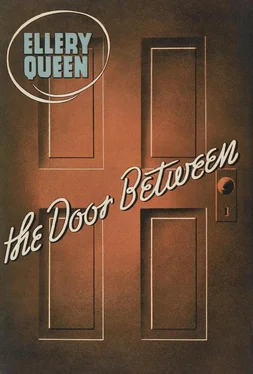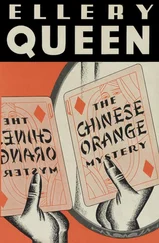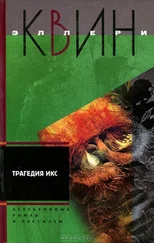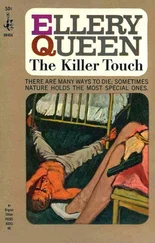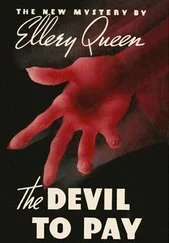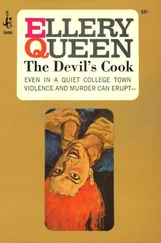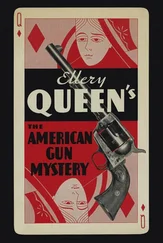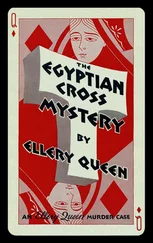“Perfectly true,” admitted Ellery.
“But the weapon,” cried the old man. “What happened to that missing half-scissors with the broken point? With the suicide weapon gone from that room, it can’t have been suicide!”
“Why must we always resent the truths we haven’t thought of ourselves? You say that the missing weapon wasn’t in that room, that therefore the crime was not suicide but murder. I say the facts point indisputably to suicide — facts all of you have overlooked. And I suggest we worry about the phenomenon of the missing weapon when we come to it.”
The Inspector sank back into his chair; and for a space he tugged at his mustache. Then he demanded in a calm voice: “What facts?”
“That’s better,” smiled Ellery. “What facts? Now we’re launched. What facts point to suicide as the answer? I say there are five — three minor, two major, with little participles of fact hanging from the last like fruit from a tree.”
Terry Ring was gaping at Ellery; he put his arm about Eva and shook his head as if he could not believe his ears. Dr. MacClure sat forward a little, listening intently.
“The minor ones are relatively weak — but only relatively. They gather strength from the major ones. Let me begin with the weak sisters.”
“First. What was the last thing, as far as we know, that Karen Leith did of her own volition before the actual events of her death? She began a letter to Morel. Who is Morel? Her lawyer and literary representative. What was the letter about? It was a demand that Morel check over her royalty moneys due to her from abroad — ‘at once, thoroughly and completely... to effect immediate payments.’ There was a definite note there, finality of demand, as if she had said: ‘Morel, the time has come to clean up my affairs.’ Foreign royalties are notoriously slow; they come in, but at their sweet time. Why this sudden insistence on immediacy? Did she need money? No, we learn she had more than enough. Why this sudden insistence,” demanded Ellery, “unless she was thinking of cleaning up her affairs — then, Monday afternoon, in her room, a few minutes before she died! Isn’t that what many suicides do just before taking their lives? It isn’t conclusive by any means, and logically it might have a simple, unaccented meaning. But... it’s a point. It’s a point that gathers strength, as I said, from the other things.”
He sighed. “The next paragraph in her letter to Morel — the paragraph she didn’t finish — we’ll never be able to evaluate beyond question, now that she’s dead. But it can’t have referred to anything but her sister Esther. Probably she intended to place the whole matter of Esther’s secret disposition, when she should be found — remember Karen died still thinking Esther was alive — in Morel’s hands. But then she crumpled the letter unfinished... as if she had changed her mind, as if she didn’t care what happened... about her money, about her sister, about secrecy, about anything. It fits. It fits with the suicide theory.”
He crushed out his cigaret. “Point three is just as inconclusive by itself and just as significant when you add it to its big brothers.” He went over to little Kinumé, crouched in a corner confused by all this talk. “Kinumé, you remember the scissors — in the shape of a bird? The thing that cuts?”
“ Oi! Missie Esther bring from Japan. It always broke. In case.”
“And it was kept always in the attic-room, was it not?”
Kinumé nodded. “Last time I seeing is when I clean attic.”
“So you did clean it,” muttered the Inspector.
“And when was that?”
“Sunday.”
“The day before Karen’s death,” said Ellery with satisfaction. “It fits! The Japanese scissors were kept in the attic, they belonged to Esther, they were never in Karen’s bedroom downstairs. Yet we find them in Karen’s bedroom after the crime. Who could have brought them down from the attic? Not Esther — Kinumé saw them there Sunday, and Esther was dead in Philadelphia Saturday night. Then the probabilities point to Karen as having fetched those scissors from the attic herself. Even if she didn’t — even if she asked Kinumé to fetch them for her (which is a distinction of no importance) — why? Certainly not to provide a convenient weapon for some murderer. Certainly not as scissors — they were broken and had no utility as scissors. I say that Karen’s deliberate fetching of that unusual implement to the scene of her death before the bolt got stuck, which was shortly before her death, indicates psychologically that she intended to use it for the purpose of taking her own life.”
“But why such a queer thing?” demanded the Inspector.
“There’s a reason for that, too,” said Ellery, “which I’ll get to in a moment.
“But let me go on to point number four, the first really powerful indication of suicide. Kinumé told me over the telephone a few minutes ago that when she left the bedroom just before Karen’s death, the Loo-choo jay — that bird that dislikes me so vociferously — was hanging in its cage beside Karen’s bed .”
“It was?” said the old man slowly.
“It was. We never thought of asking her that specific question before, and Kinumé isn’t the sort that volunteers information when she has been trained for years to keep her mouth shut. But the bird was hanging in its cage in the bedroom just before the crime, and when Eva entered the room a half-hour later, the cage was empty. This is confirmed by Terry. Let me ask you: Who released that bird during the half-hour interval?”
“Karen was the only one who could have,” muttered the doctor.
“Exactly. Only Karen. Karen released her beloved pet from its bondage.”
“But how did it get out of the room?” demanded Terry.
“Very simply. Since it couldn’t have opened the cage itself then Karen — alone in the room — must have opened the cage for it. This suggests that she took out the bird, carried it to the window, and passed it out through two of the iron bars. A human being couldn’t get out through those bars,” said Ellery casually, “but a bird could.”
He frowned. “Karen loved that cursed jay — all sorts of testimony to that effect. The bird was never allowed out of its cage. The only times it had got loose within the memory of man was when Miss O’Mara” — the Irish girl looked even more sullen — “in feeding it during an illness of Kinumé’s some weeks ago let it get away from her and it escaped into the garden. Will you tell us again, as you told us Wednesday, what happened on that occasion, Miss O’Mara?”
“I don’t know what for,” snapped the girl. “She all but tore my head off. Miss Leith, I mean; wanted to fire me. Let me go, will you? I want to get out of here.”
But Ellery said: “You see? Now we have logical reason to believe that a few minutes before she died, Karen Leith, who had always jealously kept her bird caged, herself took it from its cage and sent it off through the barred window. She gave it its freedom . Why? Why do people free well-beloved pets? Because their thralldom to an individual is over. Because their thralldom ends with the individual’s end. Because Karen Leith meant to commit suicide.”
The Inspector bit his fingernails.
“And so we come to the fifth, really the most conclusive point of all. It is compounded of an Occidental mind turned Oriental, of a kimono, of a little raised step, of a jeweled dagger, of a wound in the throat. It is compounded of everything Karen Leith’s warped soul was, and of everything Karen Leith’s tired body did. And if this point had stood alone, it would have told me Karen Leith committed suicide.”
“ Will you explain?” said the Inspector fretfully.
Читать дальше
